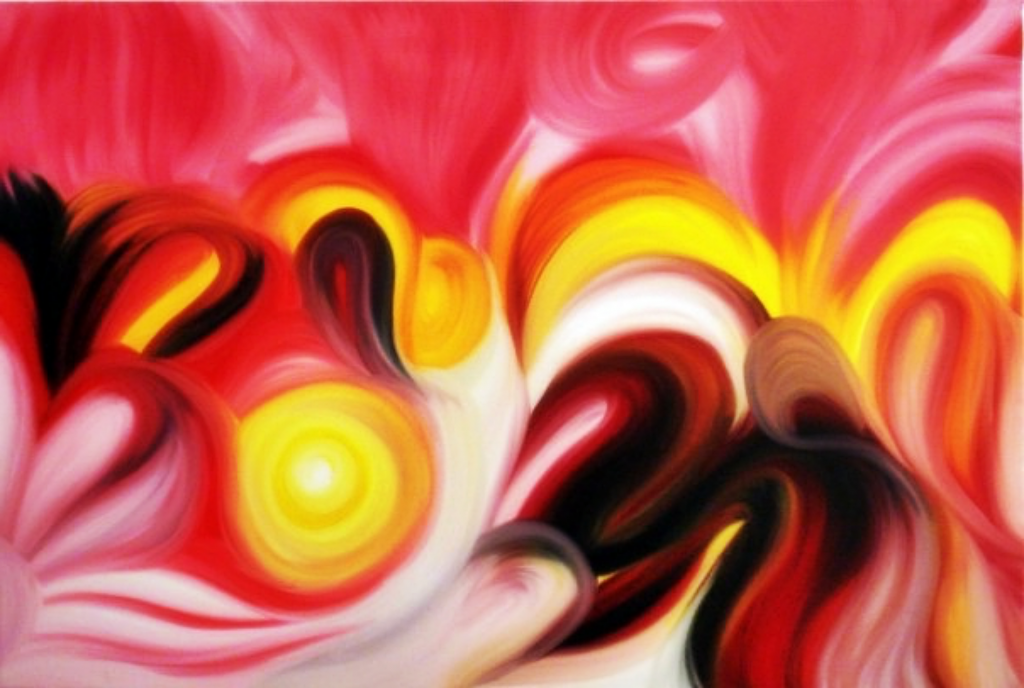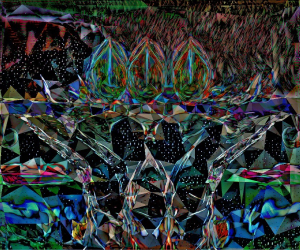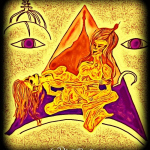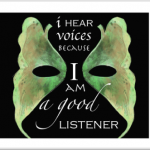
Reshma Valliappan aka Val Resh is Founder-Director of The Red Door, India. An Ashoka and Ink Fellow, Resh teaches sex-gender education with a focus on empathy and emotional health for boys and girls in community schools. She is also a painter, published writer, mime artist, speaker, and the protagonist of an award-winning documentary ‘A Drop of Sunshine’ that chronicles her journey of living without medication for schizophrenia.
Resh’s artwork from her oil painting collection ‘The Awakening’ has been featured on the cover of SRHM’s 2019 open issue.

“Painting relieves me of the varied chaos. Instead of submitting to regular methods of treatment and therapy which prove to fail me, painting comes with a guarantee of my sanity”.
When I first came across the term disability to describe schizophrenia it took me by surprise because I was surrounded by many people who spoke about their disability while also being able to show it physically. When words like ‘blind’, ‘wheelchair user’, ‘artificial limb’, ‘deaf’ were mentioned, I could see that these terms easily reflected the reality of those who came across them. Their audiences could immediately understand what was meant. The reality or existence of a disability was not questioned. There was no room for doubt that the person was truly blind, confined to a wheelchair daily, dependent on a crutch or required a sign interpreter.

Then, when I entered the arena of disability and sexuality, my invisibility became highly overwhelming. I did not belong here neither did I belong in LGBTQI spaces. What was I to call myself? The experiences others could bond over and share with each other, the issues of coming out, the battle of figuring out one’s sexuality, I had none of those to deal with. I felt left out once more. In my own group of people diagnosed with schizophrenia, none of them there shared the baggage I did either. Although many of us have had past traumas to deal with on the couches of psychotherapists and counsellors (for those of us who can afford it), none of that worked for me either. I never showed up after the third session or if I did it was mostly because I was involved in sexual innuendos that went both ways. This trait was not born out of the voices in my head or some demonic possession. This other me was created at age 15 to protect myself from adults even if it included playing around with their sexual fantasies.

Teens like me were considered hopeless. Deviants. Troublemakers. Spoilt. Violent. Useless. Embarrassments. I could hardly sit still without troubling another student or flirting with a teacher. I was thrown out of class and even the detention room couldn’t contain me since I broke it. Tables and chairs were turned into baseball gear. I hated adults. I detested them. My only aim in life was to ruin things for any adult or to flirt my way out of things, a trait many of my students in school shared too. Obviously, many of us have not had positive encounters with adults.

I was 15 when I found myself. I knew what my sexual interest were. I did engage in some of them. But adult minds operate quite ironically. They speak of such things much later in life. They advocate for sexuality and choice as adults but when a child does it, it is something that needs to be fixed, corrected or conveniently buried and ignored. It makes me wonder if most adults have even experienced puberty. Adults tend to underestimate teenagers tremendously. ‘Condescending’ is the key word. They always think we don’t know. We might not know intellectual theories and big words but teenagers always know and think through a lot of stuff while also questioning, reflecting and analysing different strategies. We might not know the entirety of life or have experienced it as much but there are so many changes happening within a teenage body and mind. I am not writing this on behalf of my 15-year-old, but I am also voicing this from my experience in educating teenagers. Teenagers want to be ‘believed’ even if we fail repeatedly in living up to it ourselves. When this belief is taken away or questioned, a teen easily shuts away.[1]
Alas, this self of mine had to face the brunt of a psychiatrist who chose to diagnose me as a transsexual. He convinced my parents that he would prepare me for a sex change upon turning 18. I trashed his office because he was talking shit. How could he know what was happening to my 15-year-old body that had only experienced 2 years of menstrual cycles and body parts which were yet developing. I was still figuring things out on my own. What had given this authority figure that much of power and leverage to decide my fate, something that was to alter the course of my life and changed everything about how my own mother saw me? One man with the title of a ‘doctor’ who met me for just 15 minutes decided my fate. I had no say. No one asked me if it was true. No one checked with me. Plans were made to move me to another country.

I was taken to him because I had run away a month before my 15th birthday. Voices had told me ‘run’ and I did. I cycled it 160 kilometres to another state in my country of birth. At a young age, I learnt that freedom came with a price. A price I couldn’t speak of because I was responsible for the legs that peddled that BMX. Home was a strange place for me. I had no intentions of returning. In my head, as I cycled, I envisioned newspapers with the headline ‘Valliappan’s granddaughter might be dead.’ I wanted to be dead to my family.

But upon returning home, I was overwhelmed by the anger which the majority of adults had towards me. I could see concern and worry written on their faces but I walked into that room filled with adults projecting a mountain of guilt on me. I heard about how bad I was to have put my parents and family through such a turmoil. Adults tried to question my behaviour, advise me, tell me to talk to someone, some scolded me. Their worry and concern to understand always came with how much trouble I had caused everyone while also ruining the family name. The day I returned home, I knew I died. Another part was born in order to deal with the never-ending judgements I had to face as I was gone for more than 36 hours.
I was then sent to ‘tough-love’ camps to turn me into the perfect child. To be changed into a girl who wore pretty dresses, who was always polite and considerate, who listened to everything my parents wanted of and from me, attended social gatherings and engaged in conversations where reciting lines from Shakespeare’s plays and knowing what my food tasted like was important to determine your intelligence. This worked for about 9 months. The behavioural camp succeeded in giving my parents the child they had always wanted, but alongside was born another part.

I find many people trying to fix kids with a pill, with counselling, with talk, with camps, with distractions, with therapy, thinking it will solve the problem when the actual problem is probably the estrangement the child feels from home. Not all children turn out like me, surely. Many would have developed skills to deal with varied estrangements in life. However, there are a majority out there who simply need to be believed in, given time and space to have a dialogue, be assured of their fears, insecurities and not t have these dismissed as false ideas and irrational thought.
It is our human right to understand and accept children for what they are. As an educator, and in conversation with other educators in the same work, we know that if we can’t teach a child, if we can’t get through to the child, if we can’t resolve something with a child, there is nothing wrong with the child. There is something wrong with us, with our adult egos and expectations. The day a child will stop looking out the window or jumping in class in fear of getting ADHD, the day a child stops talking to himself or to imaginary beings in fear of having schizophrenia, the day a child stops questioning, breaking things apart and putting them back in fear of having mood disorders, the day a child stops humming, singing or dreaming in fear of competition…that is the day the world will stop knowing joy, innocence and possibilities.
[1] No different than my ‘schizophrenic’ mind in response to a world that doesn’t believe us. Everything we say, think or do must be made up.
Please note that blog posts are not peer-reviewed and do not necessarily reflect the views of SRHM as an organisation.
